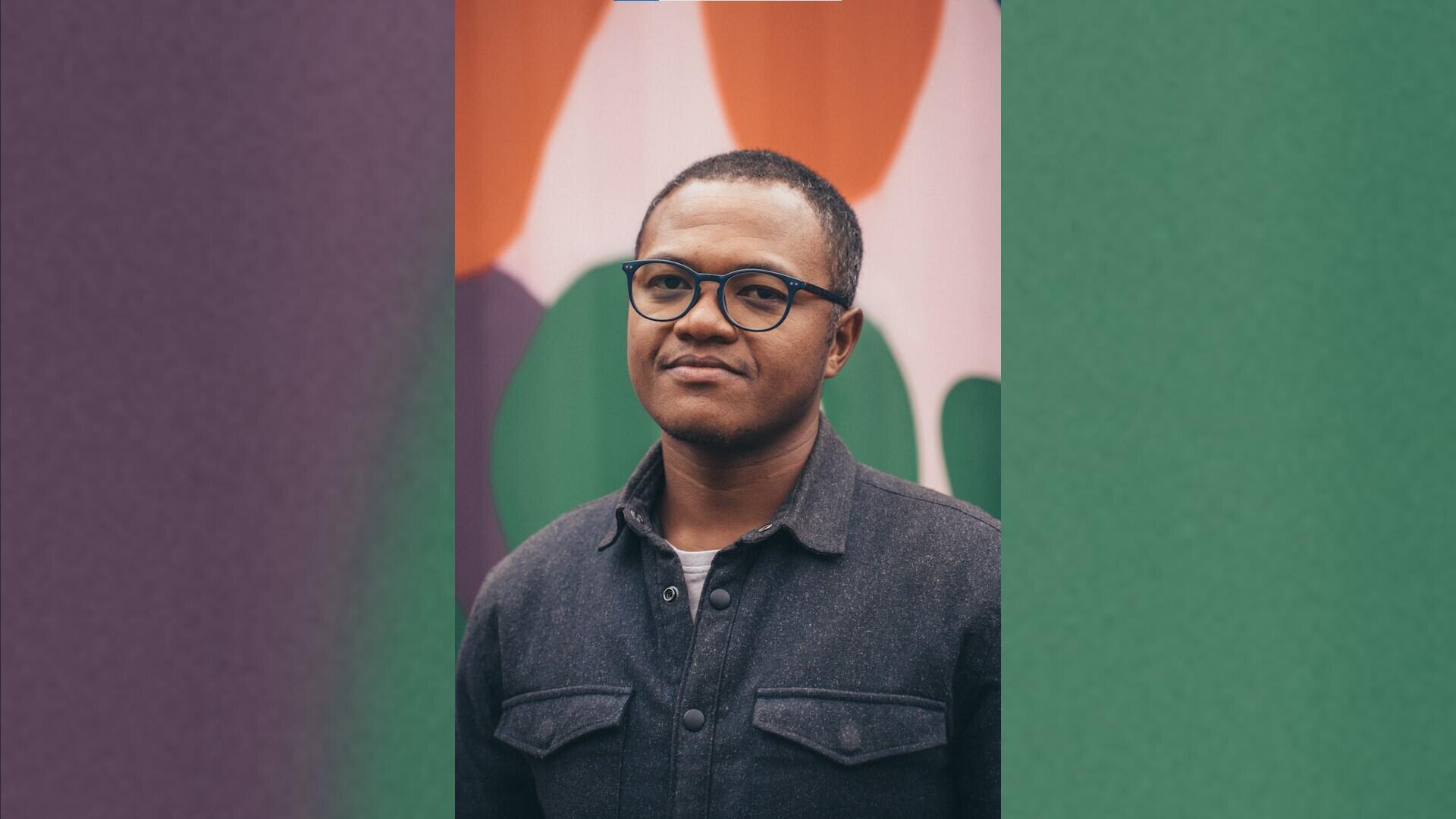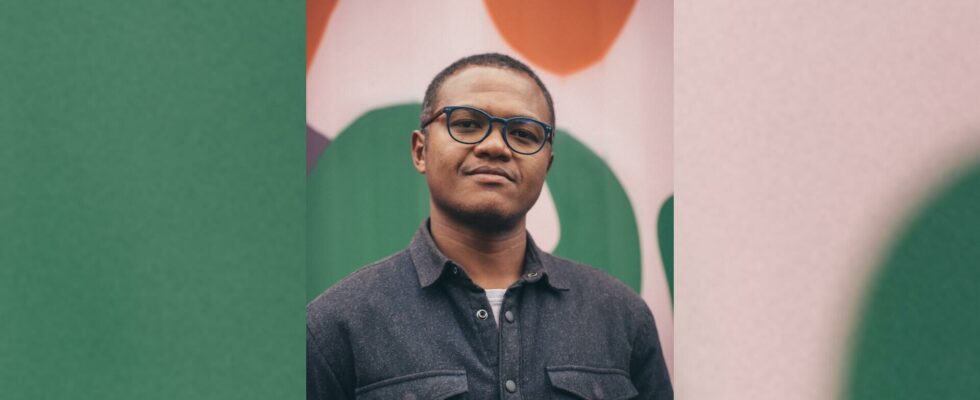In ChildMalagasy author and slammer Gad Bensalem tells with power and poetry the story of a son in search of his father and the history of his country. With this cry full of silences to shake the inertia in the face of a colonial past that does not pass, Gad Bensalem won the RFI Theater Prize 2024 which is awarded on Sunday September 29 at the Festival des Francophonies, in Limoges.
Gad Bensalem is a very busy man. Between two shows, he kindly answers the phone to us with a warmth in his voice that almost makes us forget the more than 9,000 kilometers between questions and answers. Author, director, slammer, actor, poet… to exercise the full range of his art, he often finds himself between two islands, his two ” continents », his two homes: Madagascar where he was born and where he works with the Miangaly Théâtre troupe, and Reunion where his second artistic home is located, the Koranbolaz Company: “ It’s like a playground that regularly welcomes me into my artistic projects. So yes, I have two houses, you can say that. »
Born ” far from culture »
Gad Bensalem is made of passion and perseverance. Today, he masters the French language like a Malagasy musketeer, but this man of culture comes from far away. Born in a small village in the center-east, “ far from Tana » [Antananarivo, la capitale malgache]he finds himself in a very modest family, with all that that can mean.
“ This means that ultimately we are far from everything. Far from culture, far from stability, far from lots of things… In the family, we had almost nothing. My parents moved from small job to small job. They tried to get by as best they could in this somewhat chaotic and somewhat messy Madagascar of the late 1980s, early 1990s, around the years 2000-2010, which were not good years for the country either. It’s a country like that, under construction, under reconstruction, in disrepair, a country constantly lying fallow. This is what I live in. And family history is also that. »
This universe is found in Child. A unique atmosphere which visibly succeeded in convincing the jury under the presidency of Dieudonné Niangouna to designer Gad Bensalem, winner of the RFI 2024 Theater prize. Child tells the story of an only son of a single mother who left too soon. The main character, Doda, leads a sad life as a truck driver, visibly haunted by a father who left his mother when he was still very young, but whom he has been looking for for years.
“ Child “, a story in ” a country out of time »
Bensalem located his story in “ a country out of time ”, on a “ island-continent that vomits its children “. And it is no coincidence that the nerve center of the story, a grocery bar in Ankodahoda (“nowhere”), is located on the edge of National Route 44. A nod from the author to his childhood: “ This famous RN 44 that I discuss in my text is a road that has been in disrepair for a long time. It’s a road that is approximately 350 kilometers long and that, before, we covered in 8 or 10 hours by bush taxi. So, I know her well. I also knew her during cyclone periods. It was really something. Now it has been redone. But in my memory, during my childhood, it was really the harshness of life and the distance in every sense of the word. »
Child impresses with its direct writing, ready for confrontation, concerned not to slide into miserabilism. These are 35 pages ordered like a poem, fluid like slam, without any punctuation, words in free swimming. The son, the father, the owner of the epi-bar, the prostitute… the characters parade in the atmosphere of an island threatened by the sky and the sea. We dive into poignant monologues where the waves of words break on the banks of the imagination. In Gad Bensalem there are no chapters, instead it begins with a “ first salvo “. As if he considered his words and ideas like gunshots.
“ This certainly comes from the slammer who writes. The word “slam”when he arrived from the United States to France, he lost his meaning a little. Originally, “to slam” means to slam. It took me a while to understand the true meaning of this word. I had the chance to meet the inventor of the slam poetry movement, Marc Kelly Smith. He explained to me that the real meaning was this hope of being caught by words and those that snap. Obviously, it’s the rhythm, it’s the way of presenting yourself on stage to captivate your audience, but above all there is the fact of challenging. For me, the salvos serve to challenge. It’s like a story where no one is going to escape unscathed. »
Gad Bensalem, an artist’s name
In any case, he did not emerge unscathed from his encounter with the French language. So much so that he abandoned his birth name, Rakotomanga Tokiniaina, to become Gad Bensalem. “ I was very lucky to come across people who not only had a passion for words, but also a passion for transmission. My father doesn’t even have the baccalaureate. My mother doesn’t even have the equivalent of a certificate, but I sense in them a real passion for transmission and that also comes through words. They saved words, little things, little sentences, it rocked me. »
To seize the opportunity to go to a high school that was both very popular and excellent, he left his childhood village and took the famous RN 44 to go to the capital Antananarivo, to enter the Jules Ferry high school.“ When I arrived there, French had become essential. I was reluctant to speak French. It was even a movement of defiance. What is it, this strange language of the colonizer that comes knocking at my door again? ? But, ultimately, I made it my own. French became a tool to break the foundations of something that seemed unfair or out of place to me. Afterwards, at university, the same. In 2009, in the first year of my literature studies at the École normale supérieure (ENS)in Antananarivo, I encountered the theater. It was a dazzling revelation, a trigger. The theatrical text as a tool for emancipation. »
“ Madagascar, a starting point to truly reach out to others »
Since then, his texts have maintained a tension between the Malagasy language and the French language. In the epi-bar that Doda frequents every Thursday, customers are greeted with the phrase: “ You lost but you fought », a Malagasy proverb displayed in the Malagasy language and also written in the Malagasy language in Child. So what does an author like Gad Bensalem gain by writing in French and what does he lose by not writing in Malagasy?
“ Yes, it is “Tsisy resy tsy miady”, he said while reciting this proverb in Malagasy. In fact, I challenged myself. In Malagasy, this literally means “Defeat is only the result of a fight“. The most important thing is the fight. The defeat that follows – or victory for that matter – is not that important. I thought to myself, if I translate this literally, is this really the true meaning? ? What if I translated this more freely to bring out the true essence of this proverb? ? We are often so in our language that we can’t name things and we can’t point out the subtleties of that thing. By going back and forth between French and Malagasy, the real gain is the journey and the perspective that we can take with regard to our own language, our own identifications of reality and experience. That’s what interests me about it. For me, Madagascar means taking my island as a starting point to really go towards the Other. »
In Childas strong as the balance of power between French and Malagasy, it is the appearance of the colonial past. Doda seems to be walled in his silence, a being as silent as his father. Thus, Gad Bensalem subtly evokes filiation and heritage, at the individual, family and country level. The history of the railways recalls these delicate questions in a more virulent way, through the tragedies of forced workers and people shot during the colonial era. And Doda notes that in his country, “ everything is done by force ”, which would be, according to him, “ a colonial blemish, I suppose “. For Gad Bensalem too, the colonial past remains omnipresent in Madagascar.
“ Yes. The first proof of this is the fact that we are also French-speaking. The Francophonie of Madagascar and the Francophonie of Haiti are not the Francophonie of Quebec. The second thing : the notion of inheritance is something quite strong in Madagascar, especially in terms of land. I talk about it a little bit in the text. And I wanted to let the silence speak. »

Naive, Aomby And Child
The quest for roots is a subject that has established itself in all of Gad Bensalem’s works. His first text, Naivepublished in 2017, paints a portrait of both a man and a country. It is dedicated to Albert Rakoto-Ratsimamanga, a Malagasy scientist who co-founded a movement against the colonial order in 1947. “ I always said to myself: what are my words for? Are they just used to describe, to say things that I feel inside of me? In Naivethere was already the question of wandering, of going from point A to point B.”
Same in his second text, Aombywhere he addresses Malagasy identity through the portrait of the former public enemy number one of the Big Island, the bandit and anti-hero Remenabila. “ There is also this notion of wandering which starts from “Tana” always and which goes towards the RN7 this time, therefore towards Tuléar. It’s a recurring subject that drives me and even pushes me to write. And this is once again one of the reasons why Madagascar is always the starting point, why there is always this journey towards elsewhere. »
The precarious situation of theater in Madagascar
Childhis third text, is certainly his most personal work, which the RFI Théâtre prize should help to promote well beyond the Big Island, because the situation of theater remains very precarious in Madagascar, according to Gad Bensalem.
“ What cultural actors and actresses experience in a theater company in Madagascar is not something obvious. Living as an actor or as an author of plays in Madagascar is a crazy bet. You have to know how to navigate all the possibilities, but also the pitfalls and obstacles. For example, what keeps us alive on a daily basis, economically, is not the plays, it is the workshops that we give, the training that we give via the theater, to business leaders, to young start-ups who want to pitch their projects. So they have to use words, language in front of an audience… These are somewhat additional tools that allow us to live our daily lives. In Madagascar, there are theaters, colonial legacies, old municipal halls, old municipal theaters… But, in their current use, they are completely diverted, because cultural policy no longer allows it. »
Also readFrancophonies: world premiere of “À coeur Ouvert” by Cameroonian Éric Delphin Kwégoué
